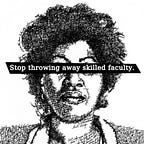An Open Letter from Howard University’s Lecturers and Instructors
The theme of Howard University’s Homecoming celebrations this year is “advocacy.” In this moment of national and global reckoning with social injustice, the university hosted a virtual national conference titled “From Protest to Policy: The Pursuit of Racial Justice.” This was a rallying cry for all of us who love Howard and take great pride in its tradition of being at the forefront of the struggle against injustice here in the United States and abroad, to “harness the spirit of Homecoming and the energy of the current moment in national politics and public discourse to imagine something different.” Given the magnitude of the moment and the historic opportunity it presents to create a more just world, it is also a time for institutional self-reflection, to ask ourselves: how do we meet the moment and live up to our highest ideals when there are open questions about the rights of non-tenure-track faculty to collectively bargain?
Howard University has fostered great minds whose ideas, activism, and art have contributed to the struggle for social equality of not just Black Americans, but of people across the United States and the world. Howard is home to a global community which has served and continues to serve as both a salve for injustice and an intellectual foundation for some of the world’s most influential change agents who have committed themselves to upholding the university’s credo of “excellence in truth and service.” It is an institution whose core value is the creation of compassionate leaders, dedicated to change and the solution of human problems.
A roll call of Howard’s alumni of faculty and students reveal an unrivaled legacy and tradition of scholar-activism. But it is also a reality that Howard’s students, staff, and faculty experience institutional challenges that call into question the extent to which the university is actively fulfilling its mission. Attesting to these challenges, the late Chadwick Boseman said: “You had to stand in one line to get to another line, to get to another line for somebody that might help you. You had to work an extra job or two.” Whether it is having to work an extra job to cover additional costs, administrative issues related to registration, or financial aid, these hardships can be daunting. Still, hardly any of us would trade the invaluable experience of studying or working at this beloved institution. Many of us have come to accept these challenges as part of the culture at Howard, but there are nonetheless long-term consequences resulting from these challenges, which affect the institution’s ability to recruit and retain exceptional students and prevent faculty from carrying forward its tradition of excellence.
Non-tenure track faculty at Howard bear the significant brunt of these consequences. We are classroom teachers responsible for a sizable portion of the courses taught in departments across the university. This is a responsibility we shoulder with great pride. We are dedicated to our students, to excellence in teaching, and to the mission of Howard University. Yet we remain the lowest paid full-time faculty among universities in and around the District of Columbia. Among lecturers, who make up the vast majority of the non-tenure track faculty, the average wage at Howard is $35,600 a year. That barely meets the threshold for a living wage for a single, childless person in DC. It is far below the living wage for those with children. By comparison, the District average for non-tenure track faculty is $70,900. As non-tenure-track faculty, we are also subject to a seven-year cap on employment, which means we are arbitrarily forced to leave the university after our seven-year term is up regardless of our job performance. This is viewed as an unfair and harmful labor practice across the field of higher education and it is enforced upon no other faculty in the city or at this university. This cap contributes to a perpetual departure of extraordinary teaching talent from Howard and has deprived students of such luminaries as Toni Morrison and Roberta Flack.
Three years ago, the non-tenure track faculty voted to unionize with SEIU Local 500. Our aim was to collectively voice our concerns regarding these conditions. For three years, we have attempted to use the bargaining table to have our voices heard by the president and the administration. Given our current political climate, we view this moment as a clarion call for the university to uphold its highest ideals. Unfortunately, the president and the administration have not been sufficiently responsive to our concerns. Negotiations have stalled and we continue to labor in an environment of uncertainty. Beyond this, the university’s resistance to our efforts sends a message that we are not valued members of Howard’s community. This is especially disheartening because many of us are sons and daughters of Howard. Serving our alma mater as faculty is a sacred trust. The administration’s seeming indifference to our voices represents a breach of that trust.
After two and a half years of attempts at good faith bargaining, which have been largely ignored, we urge the administration to return to the bargaining table. We ask you, in the spirit of advocacy and legacy of Howard University, to lend your support to our request for action from the administration.
Thank you for your support — click here to sign the petition.
